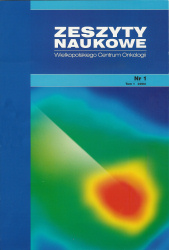Abstrakt
Leczenie nowotworów złośliwych górnego odcinka układu pokarmowego, zarówno w USA, jak i w Europie, oparte jest o postępowanie wielodyscyplinarne. Podstawą terapii jest leczenie chirurgiczne, podczas gdy radioterapia i chemioterapia stosowane są głównie jako terapie uzupełniające. Wyniki dotychczasowych badań na temat skuteczności leczenia uzupełniającego są bądź sprzeczne, jak w przypadku stosowania radio-chemioterapii w leczeniu raka trzustki, bądź znane są alternatywne schematy postępowania o podobnej skuteczności, których jednak nie porównano bezpośrednio, jak w przypadku leczenia uzupełniającego raka żołądka. O wyborze danego schematu leczenia uzupełniającego decydują lokalne preferencje. Ponieważ radioterapia w leczeniu uzupełniającym nowotworów złośliwych górnego odcinka układu pokarmowego ma więcej pozytywnych wyników badań klinicznych w USA – tam też częściej stosowana jest radio-chemioterapia pooperacyjna w resekcyjnym raku żołądka czy trzustki, podczas gdy w Europie znacznie powszechniej stosowane są, odpowiednio okołooperacyjna chemioterapia w raku żołądka, czy pooperacyjna chemioterapia w raku trzustki, zgodnie z wynikami badań europejskich wykazujących większą skuteczność takiego postępowania.
Bibliografia
Suntharalingam, M. et al. The Initial Report of Local Control on RTOG 0436: A Phase 3 Trial Evaluating the Addition of Cetuximab to Paclitaxel, Cisplatin, and Radiation for Patients With Esophageal Cancer Treated Without Surgery. International Journal of Radiation Oncology • Biology • Physics , Volume 90 , Issue 1 , S3.
Penniment, M.G. et al. Best Practice in Advanced Esophageal Cancer: A Report on Trans-Tasman Radiation Oncology Group TROG 03.01 and NCIC CTG ES.2 Multinational Phase 3 Study in Advanced Esophageal Cancer (OC) Comparing Quality of Life (QOL) and Palliation of Dysphagia in Patients Treated With Radiation Therapy (RT) or Chemoradiation Therapy (CRT). International Journal of Radiation Oncology • Biology • Physics , Volume 90 , Issue 1 , S3.
Crosby T, et al. Chemoradiotherapy with or without cetuximab in patients with oesophageal cancer (SCOPE1): a multicentre, phase 2/3 randomised trial. Lancet Oncol. 2013 Jun;14(7):627-37.
P. van Hagen, et al. Preoperative Chemoradiotherapy for Esophageal or Junctional Cancer. N Engl J Med 2012; 366:2074-2084 May 31, 2012.
Matzinger O, et al.EORTC-ROG expert opinion: radiotherapy volume and treatment guidelines for neoadjuvant radiation of adenocarcinomas of the gastroesophageal junction and the stomach. Radiother Oncol. 2009 Aug;92(2):164-75.
Lin SH, et al. Propensity score-based comparison of long-term outcomes with 3-dimensional conformal radiotherapy vs intensity-modulated radiotherapy for esophageal cancer. Int J Radiat Oncol Biol Phys. 2012; 84(5): 1078-1085.
Shinichi Sakuramoto, et al. Adjuvant Chemotherapy for Gastric Cancer with S-1, an Oral Fluoropyrimidine. N Engl J Med 2007; 357:1810-1820November 1, 2007.
Cunningham David, et al. Perioperative Chemotherapy versus Surgery Alone for Resectable Gastroesophageal Cancer. N Engl J Med 2006; 355:11-20July 6, 2006.
Macdonald John S., et al. Chemoradiotherapy after Surgery Compared with Surgery Alone for Adenocarcinoma of the Stomach or Gastroesophageal Junction. N Engl J Med 2001; 345:725-730September 6, 2001.
Ajani JA, et al. Phase II trial of preoperative chemoradiation in patients with localized gastric adenocarcinoma (RTOG 9904): quality of combined modality therapy and pathologic response. J Clin Oncol. 2006 Aug 20;24(24):3953-8.
Dikken JL, et al. Neo-adjuvant chemotherapy followed by surgery and chemotherapy or by surgery and chemoradiotherapy for patients with resectable gastric cancer (CRITICS). BMC Cancer. 2011 Aug 2;11:329. doi: 10.1186/1471-2407-11-329.
Leong T, Smithers BM, Michael M, et al. TOPGEAR: a randomised phase III trial of perioperative ECF chemotherapy versus preoperative chemoradiation plus perioperative ECF chemotherapy for resectable gastric cancer (an international, intergroup trial of the AGITG/TROG/EORTC/NCIC CTG). BMC Cancer. 2015;15:532.
Regine WF, et al. Fluorouracil-based chemoradiation with either gemcitabine or fluorouracil chemotherapy after resection of pancreatic adenocarcinoma: 5-year analysis of the U.S. Intergroup/RTOG 9704 phase III trial. Ann Surg Oncol. 2011 May; 18(5):1319-26.
Abrams RA, et al. Failure to adhere to protocol specified radiation therapy guidelines was associated with decreased survival in RTOG 9704--a phase III trial of adjuvant chemotherapy and chemoradiotherapy for patients with resected adenocarcinoma of the pancreas. Int J Radiat Oncol Biol Phys. 2012 Feb 1; 82(2):809-16.
Hsu CC, et al. Adjuvant chemoradiation for pancreatic adenocarcinoma: the Johns Hopkins Hospital-Mayo Clinic collaborative study.Ann Surg Oncol. 2010 Apr; 17(4):981-90.
Van Laethem JL, et al. Adjuvant gemcitabine alone versus gemcitabine-based chemoradiotherapy after curative resection for pancreatic cancer: a randomized EORTC-40013-22012/FFCD-9203/GERCOR phase II study. J Clin Oncol 2010;28:4450-6.
Neoptolemos JP, Stocken DD, Friess H, et al. A randomized trial of chemoradiotherapy and chemotherapy after resection of pancreatic cancer. N Engl J Med 2004;350:1200-10.
Michael D. Chuong, et al. Adjuvant chemoradiation for pancreatic cancer: what does the evidence tell us? J Gastrointest Oncol. 2014 Jun; 5(3): 166–177.
David P. Ryan, et al. Pancreatic Adenocarcinoma. N Engl J Med 2014; 371:1039-1049.
Florence Huguet,et al. Impact of chemoradiotherapy (CRT) on local control and time without treatment in patients with locally advanced pancreatic cancer (LAPC) included in the international phase III LAP 07 study. Journal of Clinical Oncology 32, no. 15_suppl (May 2014) 4001-4001
Loehrer PJ Sr, et al. Gemcitabine alone versus gemcitabine plus radiotherapy in patients with locally advanced pancreatic cancer: an Eastern Cooperative Oncology Group trial. J Clin Oncol. 2011 Nov 1;29(31):4105-12. Epub 2011 Oct 3.
